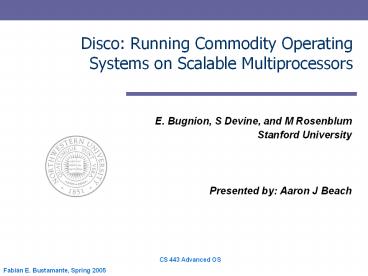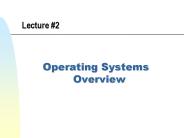Disco: Running Commodity Operating Systems on Scalable Multiprocessors - PowerPoint PPT Presentation
Title:
Disco: Running Commodity Operating Systems on Scalable Multiprocessors
Description:
Disco: Running Commodity Operating Systems on Scalable Multiprocessors E. Bugnion, S Devine, and M Rosenblum Stanford University Presented by: Aaron J Beach – PowerPoint PPT presentation
Number of Views:148
Avg rating:3.0/5.0
Title: Disco: Running Commodity Operating Systems on Scalable Multiprocessors
1
Disco Running Commodity Operating Systems on
Scalable Multiprocessors
- E. Bugnion, S Devine, and M Rosenblum
- Stanford University
- Presented by Aaron J Beach
2
Disco The main idea
- Decouple Operating System from machine hardware.
- OS runs on virtual machine
- Virtual machine is assigned resources by Disco
which manages a pool of processing
elements/memory resources
3
Goals and Challenges
- Run operating systems efficiently on scalable
multi-processor systems - Reduce overhead associated with Disco layer
- Scale above and below the Disco layer
(i.e. Many VMs and PEs) - Do this with a small implementation effort that
does not require major changes to the OS
4
The Problem
- Innovative Hardware(scalable shared memory
multiprocessors - Requires significant changes to system software
to support hardware advantages(i.e. Partitioning
OS up into units and others) - Since modern system software is so large this
requires large amounts of development time - Challenges- Overhead (memory,processing,replicati
on)- Resource Management (idle loop)-
Sharing/Communication
5
Virtual Machines
- Run operating systems efficiently on scalable
multi-processor systems - Reduce overhead associated with Disco layer
- Scale above and below the Disco layer
(i.e. Many VMs and PEs) - Do this with a small implementation effort that
does not require major changes to the OS
6
Implementation
- Managing Resources- CPUs- Memory- Advanced
Hardware (NUMA)- I/O devices- Network
interfaces - Changes to OS
7
CPU Management
- Schedules virtual machine/CPU as task
- Sets registers to virtual machine registersand
runs the task directly - Controlled (supervised) access to memory
8
Memory Management
- Another level of address translation
- Gives each virtual machine a memory space
starting at zero in the proper address size - Uses TLB for physical-to-machine translation
- Stamps entries with address space identifier to
avoid flushing TLB when changing address spaces
9
Handling Advanced Hardware
- Must deal with possibly unconstant memory
accesses - Maintains locality between cache and memory page
10
Managing I/O device access
- First translates into correct address
- Then gives the device exclusively to the machine
- This makes it so that the device does not have to
actually be virtualized for each machine, simply
access must be managed
11
Managing Network Interfaces
- Goals- avoid duplication of data if possible
- How - sharing
- Data loaded into the cache can be accessed by
other Machines, enabling communication between
machines.
12
Changes to OS and lower system
- Minimal changes, mostly to hardware abstraction
level (HAL)... very funny - Had to map machine address into supervisor
segment (changing header files) - OS downcalls resource information to Disco
- Specialized OS SPLASHOSvery basic OS supporting
SPLASH-2 appsmade with Disco in mind
13
Experiments
- Two main things we are interested in- Overhead-
Scalability - Simulated on SimOS because FLASH system is not
yet ready - Overhead- Compare with the same OS running
directly on the hardware (memory CPU slowdown) - Scalability- Measure running with different of
processors and virtual machines
14
Experiments Overhead - CPU
15
Experiments Overhead - Memory
16
Experiments - Scalability
17
Dynamic Page Migration/Replication
- To achieve locality, hot pages are replicated and
migrated to satisfy cache misses locally
18
Overview and Conclusions
- Two approaches to scalable shared memory- Large
OS development- Statically partition and run
multiple OS - Disco is more flexible and takes less
implementation to support a new OS - Disco is like unimaginitive microkernel(just
mirrors interface of hardware) - Low overhead
- Scalability
- Supports advanced hardware
- Small development effort modifying OS































